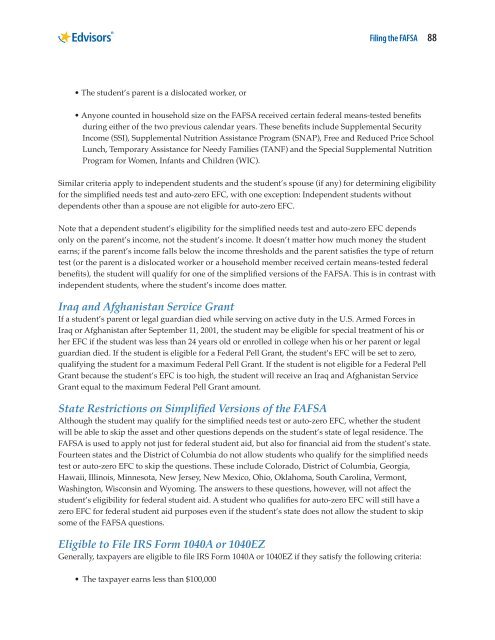filing-the-fafsa-2015-2016-edition
filing-the-fafsa-2015-2016-edition
filing-the-fafsa-2015-2016-edition
You also want an ePaper? Increase the reach of your titles
YUMPU automatically turns print PDFs into web optimized ePapers that Google loves.
Filing <strong>the</strong> FAFSA 88<br />
• The student’s parent is a dislocated worker, or<br />
• Anyone counted in household size on <strong>the</strong> FAFSA received certain federal means-tested benefits<br />
during ei<strong>the</strong>r of <strong>the</strong> two previous calendar years. These benefits include Supplemental Security<br />
Income (SSI), Supplemental Nutrition Assistance Program (SNAP), Free and Reduced Price School<br />
Lunch, Temporary Assistance for Needy Families (TANF) and <strong>the</strong> Special Supplemental Nutrition<br />
Program for Women, Infants and Children (WIC).<br />
Similar criteria apply to independent students and <strong>the</strong> student’s spouse (if any) for determining eligibility<br />
for <strong>the</strong> simplified needs test and auto-zero EFC, with one exception: Independent students without<br />
dependents o<strong>the</strong>r than a spouse are not eligible for auto-zero EFC.<br />
Note that a dependent student’s eligibility for <strong>the</strong> simplified needs test and auto-zero EFC depends<br />
only on <strong>the</strong> parent’s income, not <strong>the</strong> student’s income. It doesn’t matter how much money <strong>the</strong> student<br />
earns; if <strong>the</strong> parent’s income falls below <strong>the</strong> income thresholds and <strong>the</strong> parent satisfies <strong>the</strong> type of return<br />
test (or <strong>the</strong> parent is a dislocated worker or a household member received certain means-tested federal<br />
benefits), <strong>the</strong> student will qualify for one of <strong>the</strong> simplified versions of <strong>the</strong> FAFSA. This is in contrast with<br />
independent students, where <strong>the</strong> student’s income does matter.<br />
Iraq and Afghanistan Service Grant<br />
If a student’s parent or legal guardian died while serving on active duty in <strong>the</strong> U.S. Armed Forces in<br />
Iraq or Afghanistan after September 11, 2001, <strong>the</strong> student may be eligible for special treatment of his or<br />
her EFC if <strong>the</strong> student was less than 24 years old or enrolled in college when his or her parent or legal<br />
guardian died. If <strong>the</strong> student is eligible for a Federal Pell Grant, <strong>the</strong> student’s EFC will be set to zero,<br />
qualifying <strong>the</strong> student for a maximum Federal Pell Grant. If <strong>the</strong> student is not eligible for a Federal Pell<br />
Grant because <strong>the</strong> student’s EFC is too high, <strong>the</strong> student will receive an Iraq and Afghanistan Service<br />
Grant equal to <strong>the</strong> maximum Federal Pell Grant amount.<br />
State Restrictions on Simplified Versions of <strong>the</strong> FAFSA<br />
Although <strong>the</strong> student may qualify for <strong>the</strong> simplified needs test or auto-zero EFC, whe<strong>the</strong>r <strong>the</strong> student<br />
will be able to skip <strong>the</strong> asset and o<strong>the</strong>r questions depends on <strong>the</strong> student’s state of legal residence. The<br />
FAFSA is used to apply not just for federal student aid, but also for financial aid from <strong>the</strong> student’s state.<br />
Fourteen states and <strong>the</strong> District of Columbia do not allow students who qualify for <strong>the</strong> simplified needs<br />
test or auto-zero EFC to skip <strong>the</strong> questions. These include Colorado, District of Columbia, Georgia,<br />
Hawaii, Illinois, Minnesota, New Jersey, New Mexico, Ohio, Oklahoma, South Carolina, Vermont,<br />
Washington, Wisconsin and Wyoming. The answers to <strong>the</strong>se questions, however, will not affect <strong>the</strong><br />
student’s eligibility for federal student aid. A student who qualifies for auto-zero EFC will still have a<br />
zero EFC for federal student aid purposes even if <strong>the</strong> student’s state does not allow <strong>the</strong> student to skip<br />
some of <strong>the</strong> FAFSA questions.<br />
Eligible to File IRS Form 1040A or 1040EZ<br />
Generally, taxpayers are eligible to file IRS Form 1040A or 1040EZ if <strong>the</strong>y satisfy <strong>the</strong> following criteria:<br />
• The taxpayer earns less than $100,000


